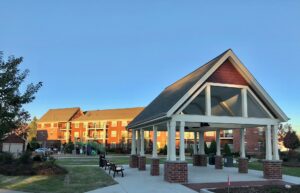An Interview with JFS Housing’s Dan Fleischman
Since 1867, Jewish Family Services (JFS) has been providing social services to the Milwaukee Community. Over the last 15 years, they’ve recognized the community’s need for affordable housing by developing multiple communities for low- and moderate-income individuals, families, seniors, and people with disabilities.
 We sat down with JFS’ Vice President of Housing and Residential Services Dan Fleischman to learn more about their journey into affordable housing, lessons they’ve learned, and their latest project Woodale Crossing.
We sat down with JFS’ Vice President of Housing and Residential Services Dan Fleischman to learn more about their journey into affordable housing, lessons they’ve learned, and their latest project Woodale Crossing.
Q: What prompted JFS to get involved in affordable housing development?
A: “Milwaukee, like many other cities in the US, has an affordable housing crisis. But the decision of JFS to venture into housing had as much to do with our direct experience with vulnerable populations as it did with any data on affordable housing. JFS case managers would go out to conduct home visits and find that their clients were living in substandard housing. JFS therapists in our mental health clinic would hear about the toll of housing instability on clients’ wellbeing.
More and more frequently, our staff would hear about people simply being priced out of decent housing – not because Milwaukee is a hot housing market like New York or San Francisco, but because the housing stock that is available to low-income renters in Milwaukee is frequently in poor condition and overpriced.”
Q: Tell us more about those early days.
A: “JFS started exploring housing development around 2007 under the leadership of then-CEO Sylvan Leabman and a dedicated Board of Directors. Since our founding in 1867, JFS has always adapted to meet community needs. We started out working to assist impoverished Jewish immigrants who were moving to Milwaukee. We then branched out to an array of services, including, at various times, an orphanage, vocational services, and outpatient medical care. Over the course of many years, we focused our efforts on core services related to mental health, case management, and other social services.
When we decided to develop affordable housing, we wanted to address the needs of not only the general community, but those of the specific populations that we have long served: seniors, persons with disabilities, persons with mental health disorders, and families with children. A growing body of research demonstrates the impact affordable housing has on these populations’ health, economic mobility, stress – even school performance. We engaged General Capital, a highly regarded real estate firm based in Fox Point, to help develop two phases of Deerwood Crossing Senior Residences, and two phases of Bradley Crossing Supportive Housing Community.”
Q: What were your goals for those first communities?
A: “From the beginning, our motivations were different from the motivations of most housing developers, and even most affordable housing developers. We knew that some of our residents faced challenges, had experienced housing instability, and needed support; so, we embedded supportive services and a mental health clinic on site. We knew that persons with disabilities experience discrimination, and have, at times, been housed in settings that have been more restrictive than necessary; so, we created integrated housing, where people with and without disabilities can live in a community and learn from each other.

Deerwood Crossing is one of very few rent-restricted assisted living residences in the entire State. At Bradley Crossing, half of all units are reserved for households with a member with a disability.
These two communities comprise a unique intergenerational affordable housing campus in Brown Deer that is dedicated to serving low-income individuals and families, with and without disabilities. There are approximately 350 residents in our housing, including 100 children.”
Q: What are some lessons that JFS has learned along the way in developing affordable housing?
A: “We learned early on that it is one thing to provide services to clients in the community, but a very different thing to provide staffing and support to residents who live with us 24/7.
The economics of supportive housing also proved challenging. The State and County provided capital funding to develop our housing, but they do not provide significant or consistent funding to provide services at our housing. In addition, our assisted living operation relies almost entirely on Medicaid funding, which provides fees of only around 60% of the market rate for assisted living services. On the real estate side, our actual expenses exceeded pro forma expenses, and our rental revenue, which is capped to maintain affordability, did not keep pace.
Several years later, however, our situation has improved. JFS Housing had an operating surplus this past year, owing largely to an increased assisted living census, increased reimbursement rates from Medicaid, and controlled operating expenses. On the real estate side, we are covering all expenses and providing a modest cash disbursement to JFS each year.
We worked to improve our supportive service model, as well. We integrated our Community Resource Program, which provides social services and programming for residents, into the larger JFS agency, bringing more staff resources out to our housing in Brown Deer. We also reenergized our mental health clinic at Bradley Crossing with additional staff and interns, providing more services for both residents and community members.”
Q: What successes have you seen? Have you seen your residents’ quality of life improve?
A: “The outcomes that we have seen at our housing confirm what the JFS social workers knew all along about the impact of affordable housing.
At Bradley Crossing, 95% of respondents to a recent survey indicated that their living situation had improved or remained the same since moving to the residence, and 77% state that they are better able to manage their stress since moving to Bradley Crossing.
The success of our housing developments, and the growing affordable housing crisis in Milwaukee, led JFS to a decision point. Should we marshal our agency resources, financial and otherwise, to try to once more build housing? Could we leverage our hard-won housing experience to impact the lives of yet more people in need of housing in Milwaukee? JFS is an agency that meets challenges head-on, so the answer was a clear, “yes”.”
Q: After making that decision, did you choose to move forward using the same approach you had in the past?
A: “In 2021, the board of JFS established a Task Force to explore the possibility of developing additional affordable housing. Initial Task Force members included Herb Zien as Chair, and Members Adam Witkov, Olga Vaynshtok, Scott Luber, Tom Gartner, Dale Streitenberger, Joe Mudlaff, and Mark Laux. Staff members included myself, John Yopps, President/CEO of JFS; and Joe Sykora, CFO of JFS.
The Task Force reviewed different development models, including the possibility of hiring a developer, as we did with General Capital for our prior projects; finding a co-developer; or developing the building ourselves. In the end, we decided to develop the building ourselves because we believe that we have the capacity at this point, and because the financial incentives to do so are significant.
We considered different populations that we might house. Should we serve seniors, families, persons with disabilities, veterans, victims of domestic violence? What type of services might we provide on-site? Or should we build more standard affordable housing without any supportive services and with no targeted population.

We decided to build upon our strengths as a social service agency and to develop more housing for seniors and persons with disabilities.
The new Woodale Crossing will provide 56 units of affordable housing, a quarter of which will be reserved for persons with disabilities who are either homeless or at risk of homelessness. The building will be located adjacent to our Deerwood Crossing development and across the street from Bradley Crossing.”
Q: It sounds like the Task Force’s work was critical in getting to this point. Tell us more about your goals for Woodale Crossing.
A: “Our experience with Bradley Crossing and Deerwood Crossing made us aware of the need for a different model of supportive housing that we plan to address through Woodale Crossing.
Persons with disabilities and chronic health conditions sometimes struggle to find supportive services in independent settings due to the shortage of caregivers, and the staffing challenge of providing care to individuals throughout the day. In addition, low-income persons who receive services through Medicaid sometimes struggle to find appropriate housing in licensed facilities due to the limited number of units that are available to persons paying through Medicaid. As a result, persons with disabilities who need supportive services frequently experience housing instability or live in settings that are more restrictive, and expensive, than necessary.
At Woodale Crossing, we will leverage the existing service infrastructure of Deerwood and Bradley to serve residents of our new building. This infrastructure includes capacity for medication administration and personal care services, wheelchair accessible vehicles for medical appointments, a commercial kitchen that operates 365 days/year, and recreational and social outings and activities. At Woodale, we will serve some of the most vulnerable residents in Milwaukee County through the integration of affordable housing, social services, supportive programming, and health-related and personal care services.”
Q: Our team is so excited to see JFS’ vision and mission for Woodale Crossing come to life. Looking back over the last 15 years, would you say the mission of JFS Housing has changed significantly?
A: “The goal of JFS Housing remains the same: to create model affordable housing communities, where adults and children, with and without disabilities, can live together, build a strong sense of community, and receive the support that they need.
156 years after the founding of JFS, we can point to a theme that connects everything that we have done, every line of service, and every population served. Whether we are providing resources to a new immigrant, counseling to someone who has experienced trauma, or housing to the homeless, we support all those who feel out of place, and who may need help feeling at home. Inspired by Jewish values, our solidarity is with anyone who needs help. At JFS, we believe that stable and secure housing is the foundation of wellbeing for all people – regardless of income, race, age, religion, or disability.
Our partnership with JLA, and the years of dedication of our Board Member Dale [Streitenberger], have been instrumental to our success. We appreciate the support of our Board of Directors, staff, community partners, and volunteers who make our work possible.”
